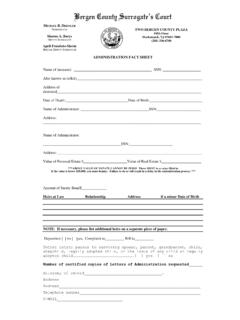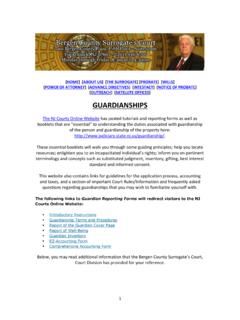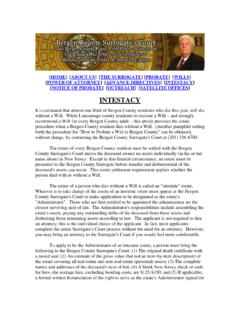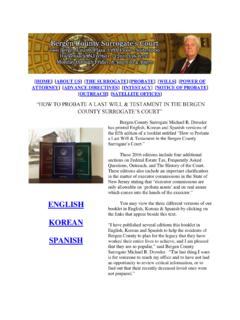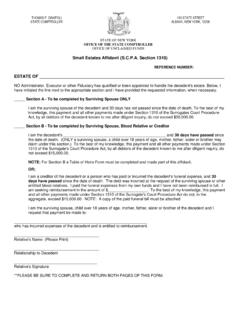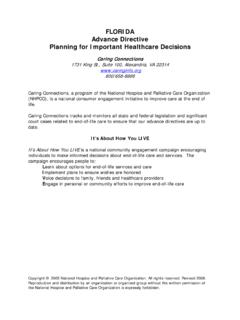Transcription of [HOME] [ABOUT US] [THE SURROGATE] …
1 1 [ home ] [ about US] [ the surrogate ] [PROBATE] [WILLS] [POWER OF ATTORNEY] [ADVANCE DIRECTIVES] [INTESTACY] [NOTICE OF PROBATE] [OUTREACH] [SATELLITE OFFICES] LAST WILL & TESTAMENT A Last Will & Testament is a legal document which allows you to determine how your assets ( , estate) will be distributed; who, when, and/or in what manner beneficiaries may receive those assets. A Last Will & Testament also permits you to choose fiduciaries such as executors (who manage the estate), trustees (who manage trusts under your Last Will & Testament) and, in the event there are minor children, who shall serve as their guardian.
2 Without a Last Will & Testament, the laws of the State of New Jersey determine who receives your assets. These laws are known as laws of intestacy. In addition, without a Last Will & Testament, the surrogate s court , based on the law, will appoint the guardian of your minor children and an administrator of your estate. Requirements Any person, at least 18 years old and of sound mind may make a Last Will & Testament. In order to be valid in New Jersey, a Last Will & Testament must be in writing; signed by the person (testator) making the Last Will & Testament and the signing must be witnessed by at least two people over the age of 18.
3 The act of the testator signing the Last Will & Testament is identified as executing the Last Will & Testament. 2 A handwritten Last Will & Testament, known as a holographic Last Will & Testament, may be valid if it can be proved that the signature and the important provisions are in the same handwriting, and that the handwriting is the testator s. This handwritten document must be probated in Superior court rather than Surrogate s court . Consequently, this is a very expensive document to probate which is why a typewritten, formally signed Last Will & Testament, is always preferable.
4 General Considerations; Self Help Computer software programs and websites now offer do-it-yourself Last Will & Testament kits. Many of these programs are not specific to individual states or to any person s personal or family circumstances. Instead, these programs offer general Last Will & Testament language which may or may not create a valid Last Will & Testament in New Jersey. Even those programs which claim to customize the document to individual states may create an invalid Last Will & Testament if there is a mistake in its preparation or in the circumstances surrounding the signing of the document.
5 While self-help programs and websites can educate you, and thereby help you save professional fees, they are rarely a substitute for professional guidance. Updating Your Last Will & Testament It is important to review your Last Will & Testament about every three (3) years, as well as any time there is a significant change in your circumstances, in order to ensure that it continues to reflect your wishes and complies with current law. Even though the laws can automatically make some changes for you, it is best to keep your documents current.
6 For example, if you should divorce and not change a Last Will & Testament that leaves the assets to your ex-spouse, those assets will be distributed as if your ex-spouse predeceased you. The result could alter your expectation as to how distribution would otherwise occur. This may or may not be what you want. Remember, it is important that you do not make handwritten changes to your Last Will & Testament after it has been signed by you and your witnesses. Care of Your Last Will & Testament It is also important never to mark up or change a signed Last Will & Testament because this may compromise its validity.
7 If you wish to change any provisions of your Last Will & Testament, it can be done through a properly executed amendment. An amendment to a Last Will & Testament is called a codicil. Codicils can be used for simple changes and are hence a part of the Last Will & Testament. Significant changes are best made by making a new Last Will & Testament. With the common use of word processing computer programs, signing a new Last Will & Testament can often be as inexpensive as signing a codicil.
8 A new Last Will & Testament avoids any risks of inconsistencies that could occur among, and from having several codicils. 3 An original Last Will & Testament should be kept in a safe, fireproof place. A photocopy of the Last Will & Testament should also be kept with your other important papers including instructions as to where the original has been stored. A safe deposit box is an appropriate place to keep a Last Will & Testament. A bank employee should be present as the box is opened. If the Last Will & Testament is contained in the box, it may be released to the named executor.
9 An alternative is to have the named executor and the successors sign the signature card for the safe deposit box. Because a Last Will & Testament may not be located immediately after, nor can it be probated until ten (10) days subsequent to a death, it is best not to rely on a Last Will & Testament for burial instructions. Those instructions ought to be specified in a private letter, or a living will, or a funeral directive. The Need for a Last Will & Testament Many people have the mistaken notion that if they die without a Last Will & Testament their spouse will always inherit their entire estate.
10 In New Jersey pursuant to 3B:5-3, the surviving spouse will inherit the entire estate only if no descendant or parent of the decedent survives the decedent; or all of the decedent s surviving descendants are also descendants of the surviving spouse and there is no other descendant of the surviving spouse who survives the decedent. Another example for needing a Last Will & Testament is if there are special considerations for you or your family, such as a special needs child, minor or adult, who receives government benefits which may be compromised or eliminated if he or she receives an inheritance outright, provisions can be made in your Last Will & Testament to protect that family member s government benefits (such as SSI and Medicaid) while still allowing them to benefit under your Last Will & Testament.
